Pamilacan Island’s rich marine life threatened by illegal fishing
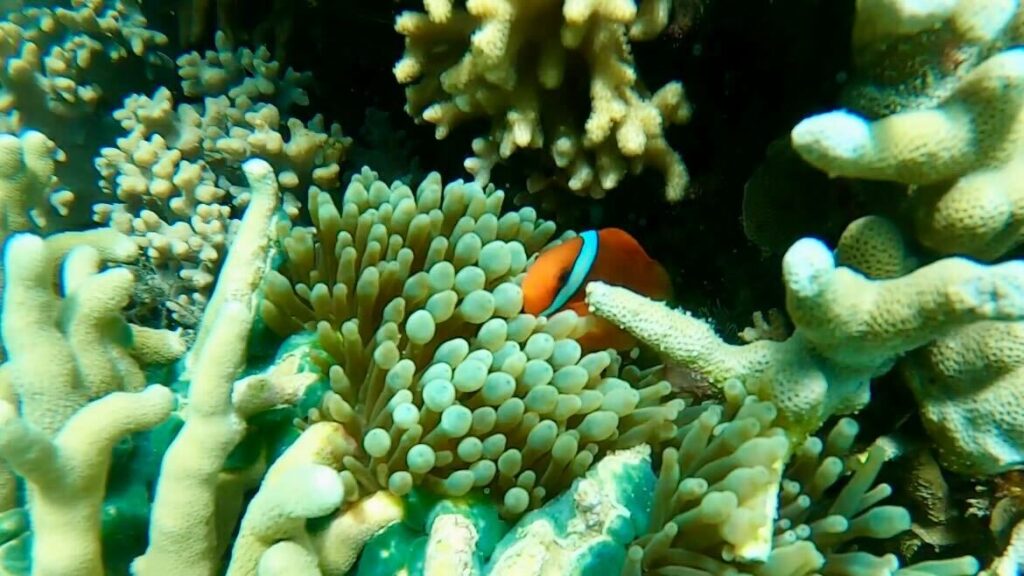
Pamilacan Island, home to a vast biodiversity, suffers from the impact of commercial fishing and political disparity. Photo credits: Internews Earth Journalism Network (2024)
BOHOL, Philippines – Pamilacan Island is a sanctuary of immense marine biodiversity. From vibrant corals and diverse fish species to majestic turtles and playful dolphins, its waters teem with life.
However, this abundance also attracts illegal fishing activities which threaten the island’s ecological balance and the livelihoods of its residents.
Located in Baclayon, Bohol, the island has suffered severe socio-economic challenges. Despite its rich marine life, Pamilacan has become both a haven and a battleground for its residents.
Impact of commercial fishing on livelihoods
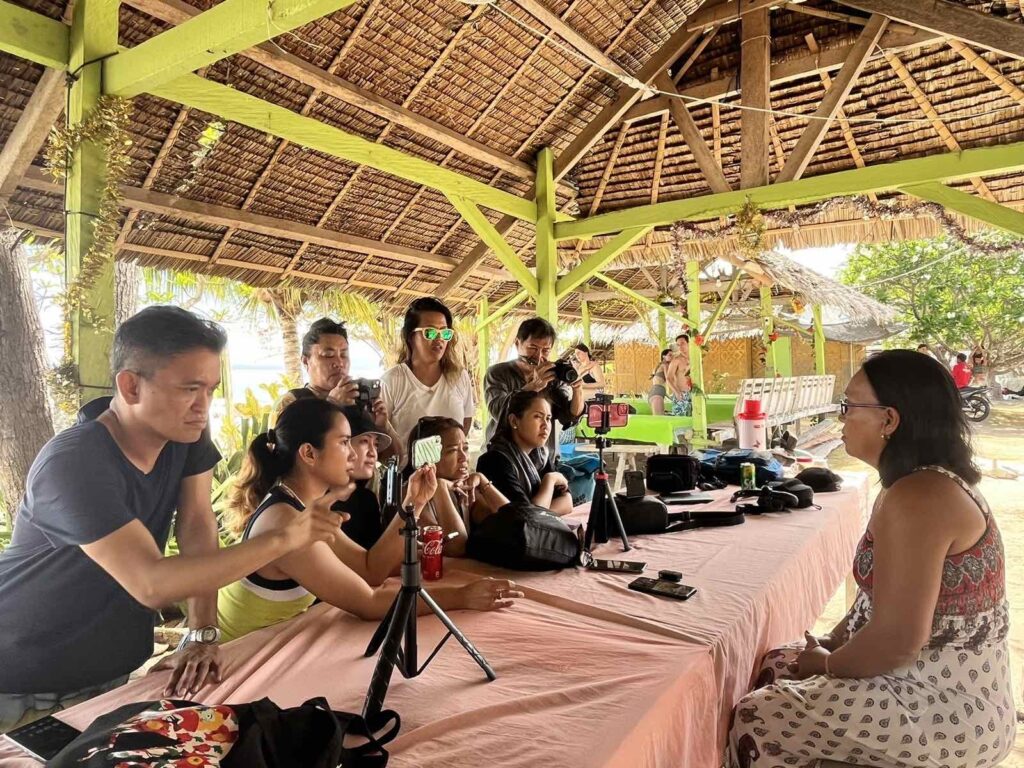
Nemesia Pingkian, a resident of Pamilacan, addresses the problems of the island, which include commercial fishing. | Photo credit: Internews Earth Journalism Network
Nemesia Pingkian, a long-time resident of Pamilacan, shared that one of the most pressing issues facing the island is commercial fishing.
Traditionally, the island’s inhabitants relied on whale and manta ray hunting for their livelihood, a practice that gave the island its name—derived from the local term “pamilak,” meaning “to use a harpoon.”
However, this practice was halted in 1997 when the World Wildlife Fund (WWF) intervened to protect the dwindling whale shark population, which marked a shift in the island’s economic activities.
Commercial fishing is defined by large-scale operations that use advanced technology to harvest massive amounts of fish, often with little regard for sustainability.
On Pamilacan Island, this practice has led to significant environmental degradation and economic disparity. Local fishermen, who traditionally use sustainable methods such as hook and line, find their livelihoods threatened as commercial fishers encroach upon municipal waters, depleting fish stocks and disrupting marine ecosystems.
Pingkian recounted how local fishermen’s monthly catch is often equivalent to what commercial fishers haul in a single day.
“Malaki ang agwat talaga,” she said.
“Mayroon silang makabagong teknolohiya tulad ng mga fish finder at malalaking lambat na hindi namin kayang tapatan,” she added.
The impact of commercial fishing not only threatens the livelihoods of residents but also undermines the preservation of marine life they have been protecting. This results in economic hardship and heightens social tensions within the community.
“Sana talaga matulungan kami laban sa mga komersyal na mangingisda na ito,” Pingkian said.
Political disparity a problem too
While commercial fishing is a heightened concern, the underlying issue plaguing Pamilacan Island is the political disparity between its barangay officials and the mainland government.
The said political rift hinders the implementation of effective policies and the provision of essential services, which leaves the community vulnerable and neglected.
A study on political disparity highlights how a lack of cooperation between local and higher government levels can stymie community development (Emerald Insight, 2022). The research indicates that communities suffer when local governance is misaligned with broader political structures, leading to inefficiencies and unaddressed grievances.
For Pamilacan, this disparity means that critical infrastructure projects, such as the repair of the desalination plant, are delayed or neglected due to bureaucratic gridlock and political infighting.
‘Politics is a major problem’
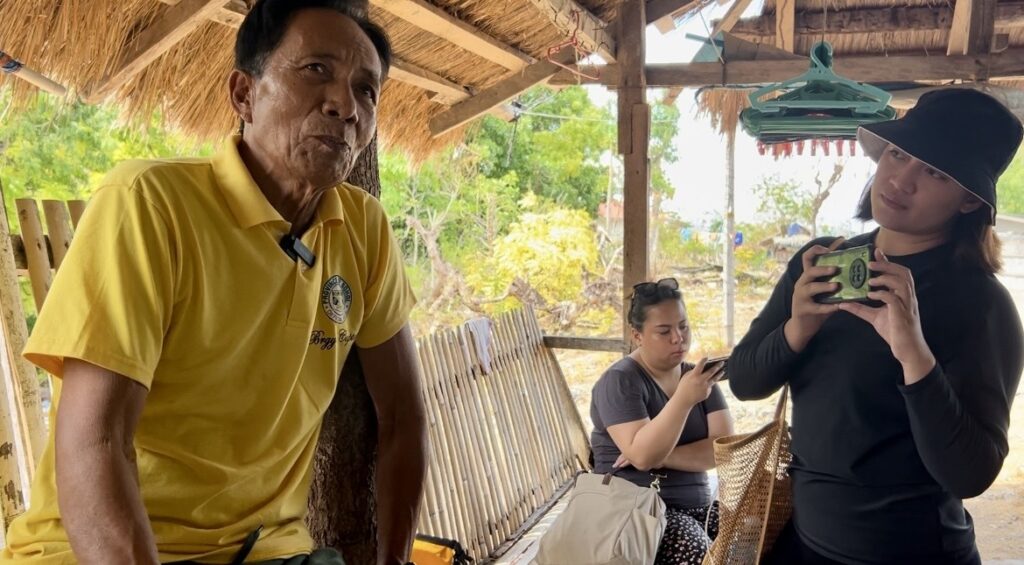
Crispo Valeroso, the barangay captain of Pamilacan, explains the difficulty of Pamilacan in connecting to the mainland LGU due to political disparity. | Photo credit: Caecent Magsumbol
Crispo Valeroso, the barangay captain of Pamilacan, highlighted the widespread and significant effect of commercial fishing on the island.
“Pinaka problema sa Pamilacan kay ang commecial fishing gyud, hindi pa na sosolve kay if wala pa siguro na, di unta maglisod ang mga tawo,” Valeroso said.
While he stressed the need to strictly enforce fishing regulations to safeguard the interests of local fishermen, Valeroso lamented the lack of cooperation and assistance from the mainland government.
“Isa gyud na sa problema, yung politika, hindi ako ano sa admin ngayon kay kalaban sa politika. Kanang gitirhan sa coast guard ngayon, duplex na sa health center pero hanggang ngayon wala pa natunrover,” he shared.
During the last elections, Valeroso shared that there was a sentiment among certain individuals to seize control of Pamilacan. The competition was fierce, with just an 18-vote margin deciding the victor.
Valeroso recounted the ongoing challenges in implementing a ban on commercial fishing within municipal waters, citing political inaction as a major obstacle to achieving this goal. He also pointed out the critical need for consistent enforcement and support from the mainland authorities.
“Kining problemaha dugay na ni namong gipaabot. Madalas jud na nga problema na akong gipaabot nila sa LGU,” he said.
Town official blames lack of cooperation of brgy execs
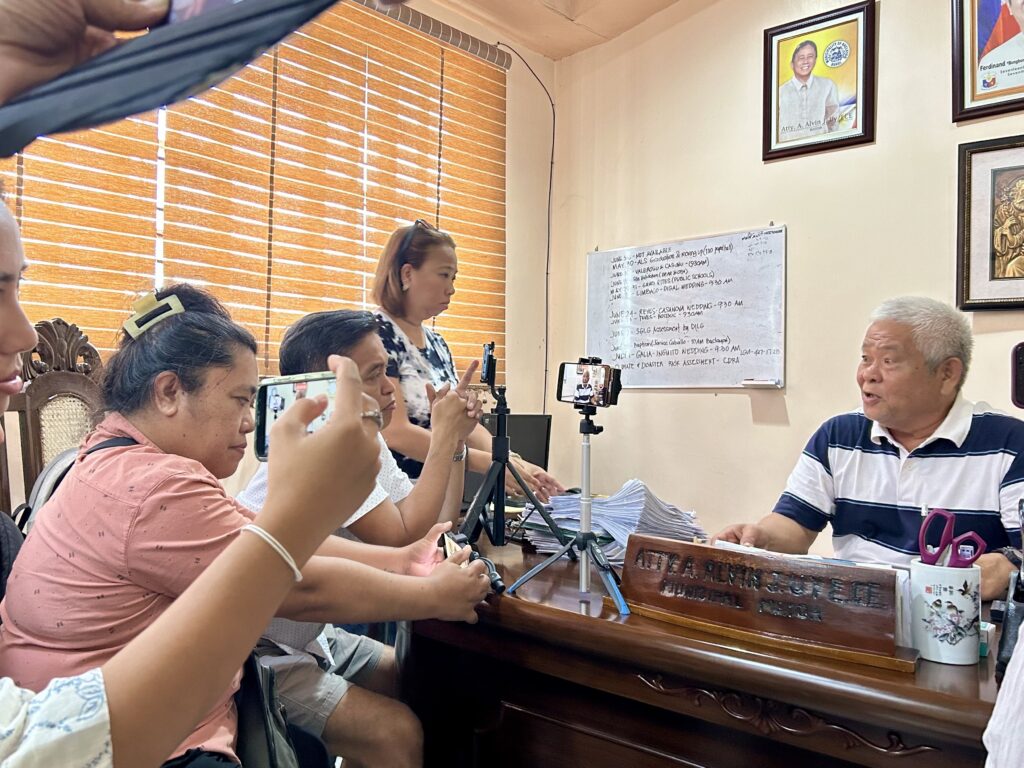
Romy Balangkig, the Vice Mayor of the Municipality of Baclayon, explains that there have been efforts, but Pamilacan officials lack cooperation. | Photo by: Pia Piquero
Meanwhile, Vice Mayor Romy Balangkig of Baclayon offered a contrasting viewpoint on the political dynamics affecting Pamilacan.
He highlighted the efforts by the current administration to organize Bantay Dagat teams for monitoring and enforcement, yet he noted the limited cooperation from Pamilacan’s barangay officials, which undermines these initiatives.
“That’s also the problem sa Barangay officials sa Pamilacan. I can say dili kaayo sila mo cooperate sa administration karon sa incumbent Mayor [Alvin] Uy,” he explained.
He mentioned previous attempts to improve local infrastructure and services, like establishing Pamilacan High School and the desalination project, which have stalled due to political conflicts.
Balangkig said that they have been making efforts to assist the island, particularly regarding commercial fishers, by providing enforcement pump boats. However, the issue lies in the fact that the boats used by commercial fishers are much more advanced, making it difficult for the enforcers to apprehend them.
Despite this dilemma, the vice mayor ensured that, with participation and cooperation from both the island and the mainland, they could still collaborate to safeguard the island from commercial fishing.
“Please coordinate sa officials sa mainland. Ang problema sige sila bagutbot-bagutbot…Actually, naa na tay Bantay dagat didto, that’s why I’m saying please cooperate. Please coordinate,” he expressed.
Balangkig believed that the current administration is committed to addressing Pamilacan’s issues, however, stressed that these efforts can only be successful if there is cooperation from the barangay officials, which has been insufficient due to political rivalries.
Ongoing efforts to bridge political gap
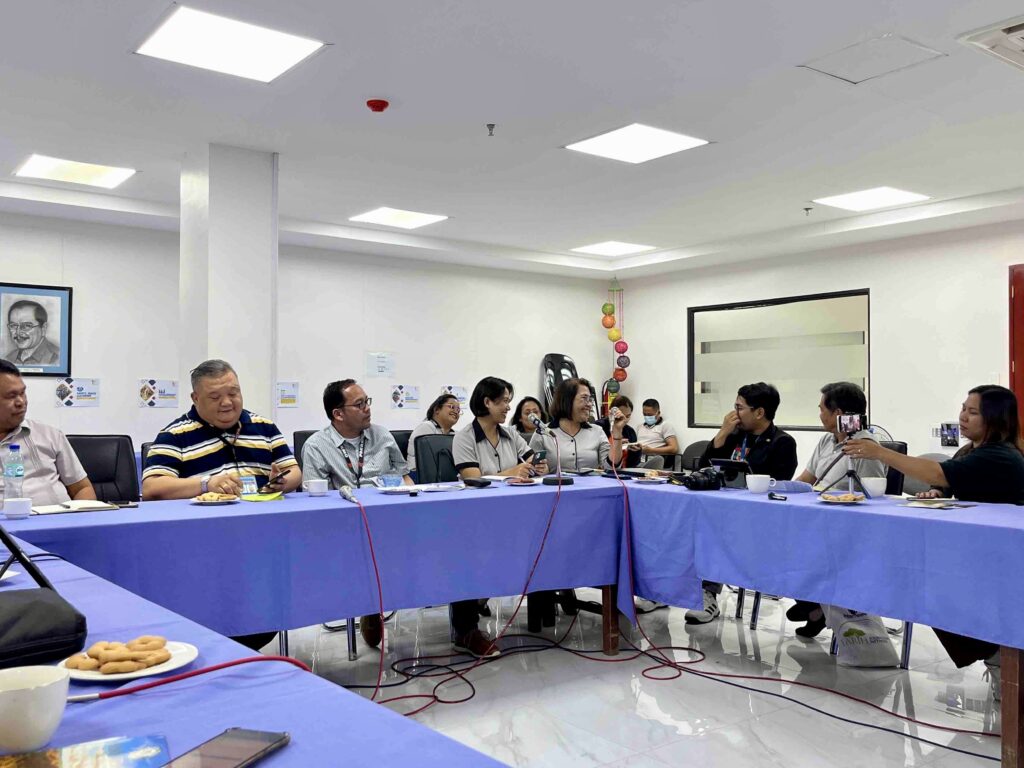
The provincial government officials, in a round table discussion, address ongoing efforts to bridge the political gap between Baclayon LGU and Pamilacan Island. | Photo credit: Internews Earth Journalism Network
Joanne Pinat, the office-in-charge of the Bohol Provincial Tourism Office, discussed the ongoing efforts of the provincial government to bridge the gap between Pamilacan’s barangay officials and the mainland government.
“We [the Provincial Government] are constantly working to connect the barangay and the LGU to ensure that Pamilacan’s needs are met,” Pinat asserted.
Pinat emphasized that what was greatly needed was mediation and open communication in resolving the island’s challenges.
“Kinahanglan lang gyud naay mag mediate, ipasabot.. its just proper communication and openness,” Pinat said.
She noted that the provincial government has been in dialogue with the local government of Baclayon about the issue, during which she noted that the LGU promised to support Pamilacan despite the known disparity.
Despite the challenges of regulating well-equipped commercial fishers, Pinat emphasized the ongoing efforts to enhance enforcement capabilities.
“We are working with the LGU to enhance patrol capabilities and ensure that the regulations are enforced effectively,” she explained.
Pamilacan Island faces major challenges from environmental damage, economic struggles, and political issues. The shift from fishing to tourism shows its potential for sustainable growth, but success relies on closing the political gap and fostering cooperation between local and higher governments.
A unified approach, combining local knowledge and external support, is essential to overcome these obstacles. With concerted efforts, Pamilacan Island can continue to thrive as a symbol of natural beauty and cultural heritage. /clorenciana
Disclaimer: The comments uploaded on this site do not necessarily represent or reflect the views of management and owner of Cebudailynews. We reserve the right to exclude comments that we deem to be inconsistent with our editorial standards.
